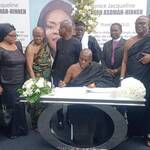The National Peace Council (NPC) has reached a consensus with all mission schools in Ghana on the use of hijabs, paving the way for enhanced religious tolerance in educational institutions across the country.
Mr George Amoh, the Executive Secretary of the NPC, said the agreement was reached after extensive engagements with heads of those schools and other stakeholders to address concerns about religious expression in schools.
“All the mission schools, whether Islamic or Christian, that have something to do with education in this country, have all bought into the idea and have endorsed the document,” he said.
“As I speak to you, none has restrained. So, we are just waiting for the Ghana Education Service to give the endorsement, then we officially declare the document launched,” he said.
Mr Amoh made the disclosure on Monday in Accra during a familiarisation visit by Mr Mohammed Mubarak Muntaka, the Minister of the Interior.
The use of hijabs in mission schools has been a contentious issue in Ghana, with past incidents sparking national debates on religious freedom and discrimination.
In 2015, the Peace Council initiated a dialogue with religious groups and mission schools following reports of Muslim students being restricted from wearing hijabs in some Christian-founded institutions.
The discussions at the time resulted in a 10-point communique outlining steps to promote religious tolerance.
However, Mr Amoh noted that the implementation was stalled by various challenges, including financial constraints and administrative barriers.
“When the issue of Wesley Girls’ Senior High School came up, we thought we should revisit that campaign,” he said, referring to a 2021 case where Muslim students were denied the chance to fast as required in Islam during the month of Ramadan.
“What should be the conduct of a student in a school that does not subscribe to the religion that the student subscribes to?” Mr Amoh asked.
“So, these are the issues that the document has tried to resolve, and we have done this together with all the interest groups,” he explained.
The new agreement extends beyond hijab use and includes guidelines on religious practices such as fasting and the display of religious artefacts in schools.
It aims to strike a balance between upholding students’ rights to religious expression and maintaining institutional discipline.
He said the MoU aligned with Ghana’s Constitutional provisions on freedom of religion and association.
Mr Amoh said the GES had been part of the drafting process, but formal approval was needed from the new leadership before the document can be publicly launched.
He expressed optimism that once in effect, the agreement would help prevent future disputes over religious practices in schools and promote a culture of mutual respect and coexistence.
“The Constitution of Ghana guarantees freedom of association, freedom of religion, and the right to practice one’s faith. This agreement will help ensure that schools reflect these constitutional values while maintaining order and discipline,” he added.
Mr Muntaka, on his part, lauded the NPC for their tireless efforts towards sustaining Ghana’s peace.
“As I stand before you, I’m reminded of the critical role the Peace Council plays in promoting peace, stability and national cohesion in Ghana. The organisation is a shining example of the importance of peace and reconciliation in nation building,” he said.
He assured them of his support to enhance their capacity to carry out their mandate.
- Wednesday, April 16, 2025 Newspaper Headlines - 16 April 2025
- Road crashes: 752 killed in 3 months, a 23.5% rise - 16 April 2025
- IGP host Guard of Honour for newly appointed CDS - 15 April 2025




